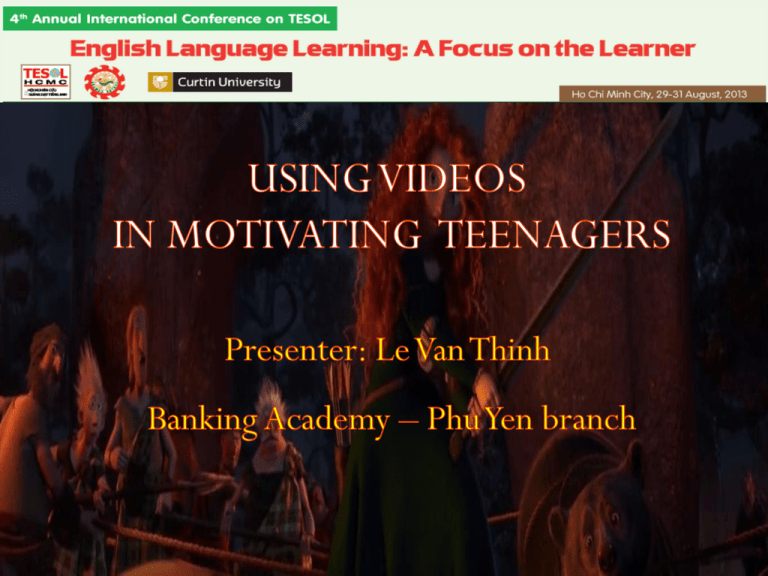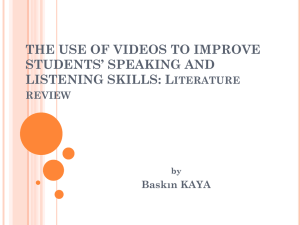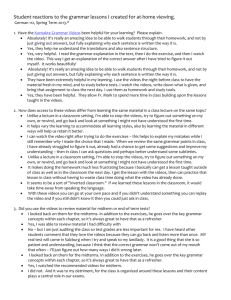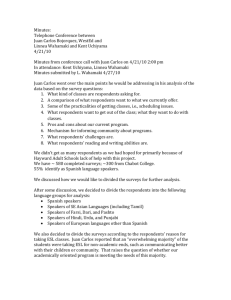Document
advertisement

Contents 1 Introduction 2 Literature review 3 Methodology 4 5 Data analysis and discussion Conclusions and recommendations Chapter 1: Introduction Grammar translation method (Dinh, 2010) Test and examination Listening and speaking neglection Chapter 1: Introduction Need to be motivated Chapter 1: Introduction Chapter 2: Literature review - Videos enhance ‘perception, attention, encoding, memory, and comprehension’ (Alessi and Trollip, 2001) - Real context - Authentic language with cultural information - Non-verbal language Chapter 3: Methodology Chapter 3: Methodology Chapter 3: Methodology Chapter 3: Methodology Chapter 3: Methodology 1. Why did Merida prevent other people from killing the bear? 2. Who saved Merida from being killed by Mordu? 3. How did Mordu die? 4. Summarize the scene. Chapter 3: Methodology Research instruments 1. Questionnaire 2. Interview 20 students 6 students Chapter 3: Methodology 1. Do videos motivate students in learning English in the rural area? Research questions 2. What difficulties do students encounter while watching videos? Chapter 4: Data analysis and discussion Student’s evaluation of Number of respondents videos Interesting 17/20 Fascinating 14/20 Relaxing 16/20 ‘Videos help me entertain and study better’ (6/6) ‘I am looking forward to the English class every day’ (3/6) Chapter 4: Data analysis and discussion Skills are improved Number of respondents Listening skills 20/20 Reading skills 9/20 Speaking skills 6/20 Writing skills 3/6 ‘My listening skills were improved’ (6/6) Chapter 4: Data analysis and discussion Students’ difficulties Not enough vocabulary to Number of respondents 12/20 fully understand Feel frustrated 6/20 ‘I feel lost when the videos have too many scenes I don’t understand’ (3/6) Chapter 4: Data analysis and discussion Activities students Number of respondents like Discussion 12/20 Writing summary 5/20 Grammar learning 2/20 Chapter 4: Data analysis and discussion Students’ favorite movie Number of respondents genres Animated films 12/20 Action 9/20 Comedy 7/20 Horror 4/20 Romance 1/20 Chapter 5: Conclusions and suggestions - Interest students and enhance their listening and speaking skills. Chapter 5: Conclusions and suggestions - Choose a suitable film. + Students’ favorite movie genres + Clear visual support + Appropriate speech delivery + Interesting and humorous content - Pre-teach vocabulary. - Introduce the context. - Set the task before letting students watch the film. - Guide students to perform post-watching video task. References Alessi, S. M., & Trollip, S. R. (2001). Multimedia for learning: methods and development. (3rd ed.) Needham Heights MA: Allyn & Bacon. Arthur, P. “Why use video? A teacher’s perspective”, VSELT 2:4 (1999):4 Baltova, I. (1994) “Impact of video on the comprehension skills of core French students’. Canadian Modern Language Review, 50:3. Burt, M. (1999). Using Video with Adult English Language Learners. National Center for ESL Literacy Education. Retrieved from: http://www.cal.org/caela/esl_resources/digests/video.html Canning-Wilson, C. 2000. Practical aspects of using video in the in the foreign language classroom. The Internet TESL Journal. VI, 11. Retrieved from http://iteslj.org/Articles/Canning-Video.html Dinh, T. P. T. “Techniques for teaching English grammar in four selected schools in Bien Hoa city”. MA. thesis, University of Social Sciences and Humanities-Ho Chi Minh City, 2010. Herron, C., Hanley, J. and Cole, S. (1995) “A comparison study of two advance organizers for introducing beginning foreign language’ The Modern Language Journal. Volume 79, Issue 3. Pages 387 – 395. King, J. (2002). Using DVD feature films in the EFL classroom. Taylor & Francis Online Volume 15, Issue 5, 2002. Retrieved from: http://www.tandfonline.com/doi/abs/10.1076/call.15.5.509.13468#preview Sherman, J. (2003). Using Authentic Video in the Language Classroom. UK: Cambridge University Press Williams, R. T., & Lutes, P. (2008). Using video in ESL classroom. 高松大学紀要, 48(1),











